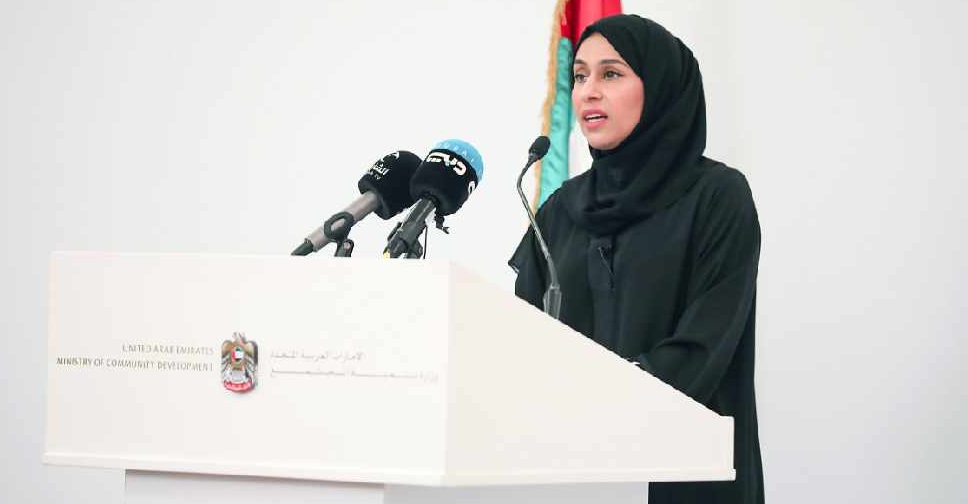
Hessa Essa Buhumaid, Minister of Community Development and Vice Chairman of the Digital Wellbeing Council, says building a positive digital reality is becoming more crucial during the pandemic.
She made the statement during a media briefing organised by the Ministry to announce the details of the National Digital Wellbeing Policy which was approved by His Highness Sheikh Mohammed bin Rashid Al Maktoum, Vice President and Prime Minister of the UAE and Ruler of Dubai, at the Cabinet’s session last week.
The UAE is on top of the global ranking list in the internet and social networking group indicators with 99 per cent. The country also topped the world in the social networking indicators among the total population as well as the global index of subscriptions to mobile phones services with 187 per cent of the total population in 2019.
Buhumaid emphasised that the National Digital Wellbeing Policy strongly supports societal leadership in education and remote work in line with the directives of the UAE’s leadership towards the population whether Emiratis, residents and visitors.
The principles of the National Wellbeing Strategy 2031 is about building a safe, secure and positive digital community. It coincides with the UAE centennial vision 2071 through achieving development goals towards the future, especially in preparing the society with needed skills, knowledge and behaviour that respond to rapid changes.
The minister said, "The policy reflects the spirit of hope and preparation for the future through the vision of His Highness Sheikh Mohammed bin Rashid Al Maktoum, who said, 'If anyone thinks that the world after COVID-19 will be the same as the one before is mistaken’, and the quotes of His Highness Sheikh Mohamed bin Zayed Al Nahyan, Crown Prince of Abu Dhabi and Deputy Supreme Commander of the UAE Armed Forces, when he said 'Values and ethics play an essential role in society, the UAE is capable of overcoming the crisis, do not worry.'"
Buhumaid elaborated, "We at the Digital Wellbeing Council are seeking to build a positive reality for technology and the digital world, where everyone interacts in a balanced and sound way. This task is becoming increasingly important under COVID-19 where global efforts continue to plan on how to coexist, extrapolate the new world, employ technology significantly and rapidly to find several solutions that ensure business continuity and education through work and distance education applications."
The minister referred to some figures that promoted this policy as a development priority. In 2019, the total number of people around the world using the internet reached 4.13 billion people, while the proportion of social media users was 80 to 90 per cent of the population in many developed countries, and is on the rise due to the pandemic that requires intense work technology, distance education, digital shopping, entertainment and other applications.
The minister explained that the development of digital well-being and its requirements have grown in areas that require interaction with the digital world such as distance learning requirements, digital learning, digital research and curriculum, career requirements such as remote work, research, e-mails, government services platforms, smart services and government work in general, communication, social communication, communication platforms, chatting, visual and audio sharing, entertainment, electronic games, short films and online shopping.
She also referred to the four main pillars of policy including 11 diversified initiatives.
The pillars are building the capacities of members of the community such as children, young people, senior citizens; digital behaviour; consolidating positive digital values and behaviour in all social media platforms and coexisting with all virtual societies as adopt the values of the Late Sheikh Zayed bin Sultan Al Nahyan; establishing legislations and regulations that accommodate the changes of the digital world to protect users from suspicious digital risk, and finally, Digital content – guiding the community to use the digital world and content positively to reduce exposure to harmful or hateful content through legislation or technological means.
The minister noted a set of initiatives in digital capacities such as an integrated digital portal that includes awareness content in its first phase to support all the members of the community; embracing digital citizenship and wellbeing in the curriculum through all schooling stages; embedding digital well-being ambassadors initiative to qualify a group of children in schools on the principles of digital wellbeing to be represented at their schools and the community around them; capacity building programme for senior citizens; and awareness videos of the basics of using modern technologies to qualify senior citizens keep up with modern technologies and organise vocational courses within the Vocational School for the youth. These are integrated training programmes for training young people in the field of technology.
In the digital behaviour pillar, several initiatives were approved such as Digital Citizenship Values and Behaviours. These principles are based on the culture and values of the UAE to deal with the digital world positively and properly, the Guide to Electronic Bullying, a guide to identifying and managing cyberbullying in the event of exposure.
In the digital communication pillar, the initiatives include maintaining digital wellbeing by providing consultations on all the challenges of the digital world, reviewing the laws and legislations related to the digital world by updating the necessary connected laws to the digital world at an accelerated pace in the era of digital governance.
Finally, the focus of digital content with its initiatives – digital classification of electronic games by providing an electronic guide to the evaluation of electronic games to help parents choose games that are suitable for the age of their children to create conscious generations, committed to their Emirati values. The digital content support initiatives are a set of media supporting digital initiatives which support digital content such as media campaigns, awareness videos and educational publications.





 Dubai serves 6.39 million public transport passengers during Eid
Dubai serves 6.39 million public transport passengers during Eid
 UAE National Guard conducts 168 search, rescue missions in Q1 2025
UAE National Guard conducts 168 search, rescue missions in Q1 2025
 RTA agrees global partnerships to operate autonomous taxis in Dubai
RTA agrees global partnerships to operate autonomous taxis in Dubai
 Watch: H.H. Sheikh Hamdan visits Reserve Forces Command
Watch: H.H. Sheikh Hamdan visits Reserve Forces Command


